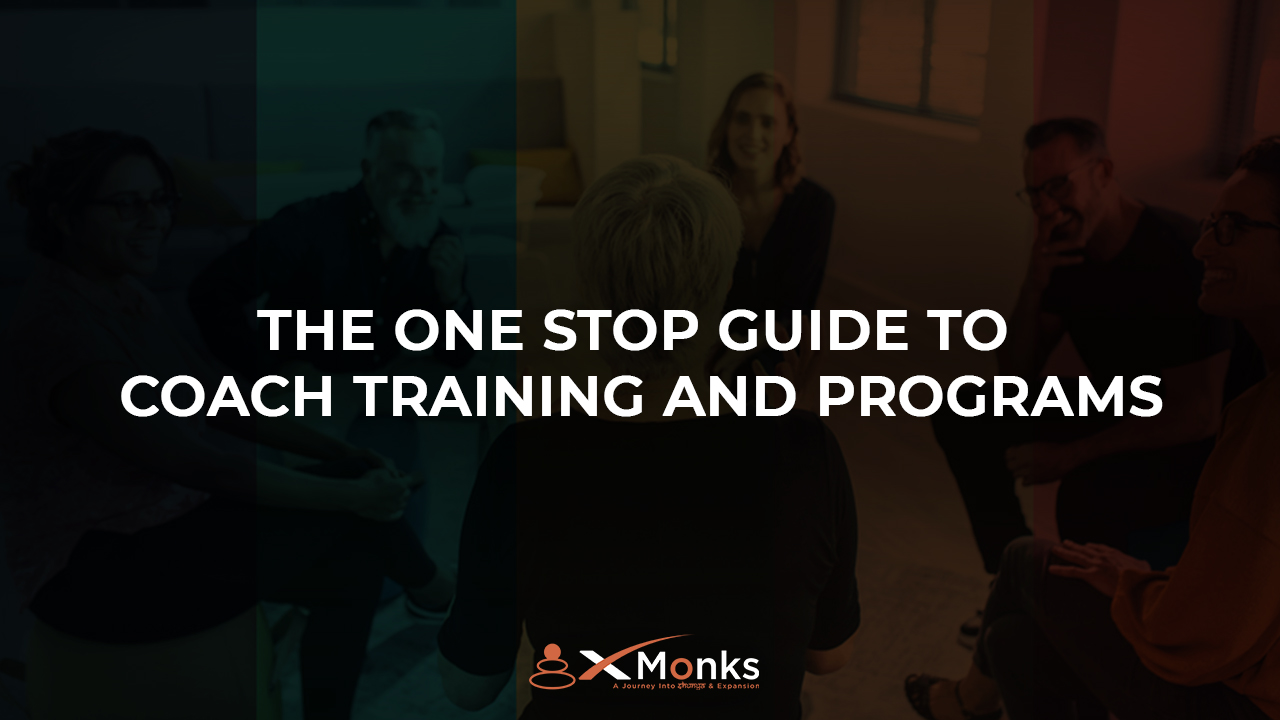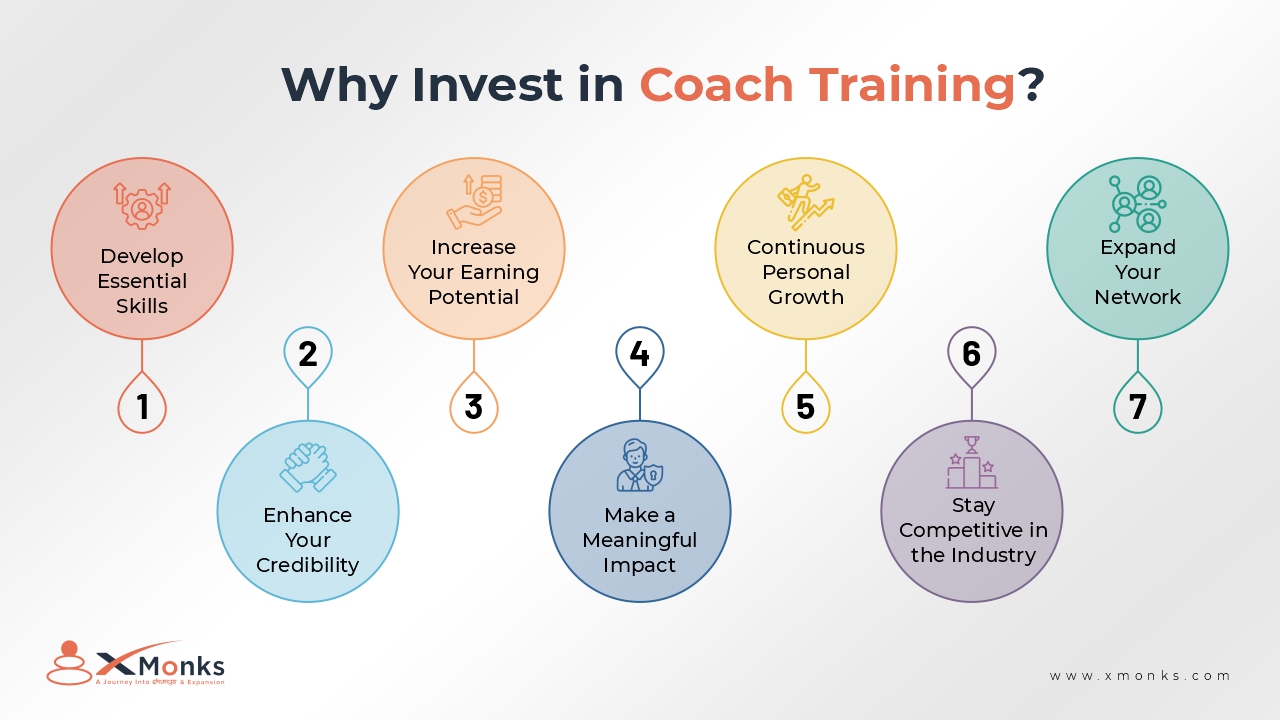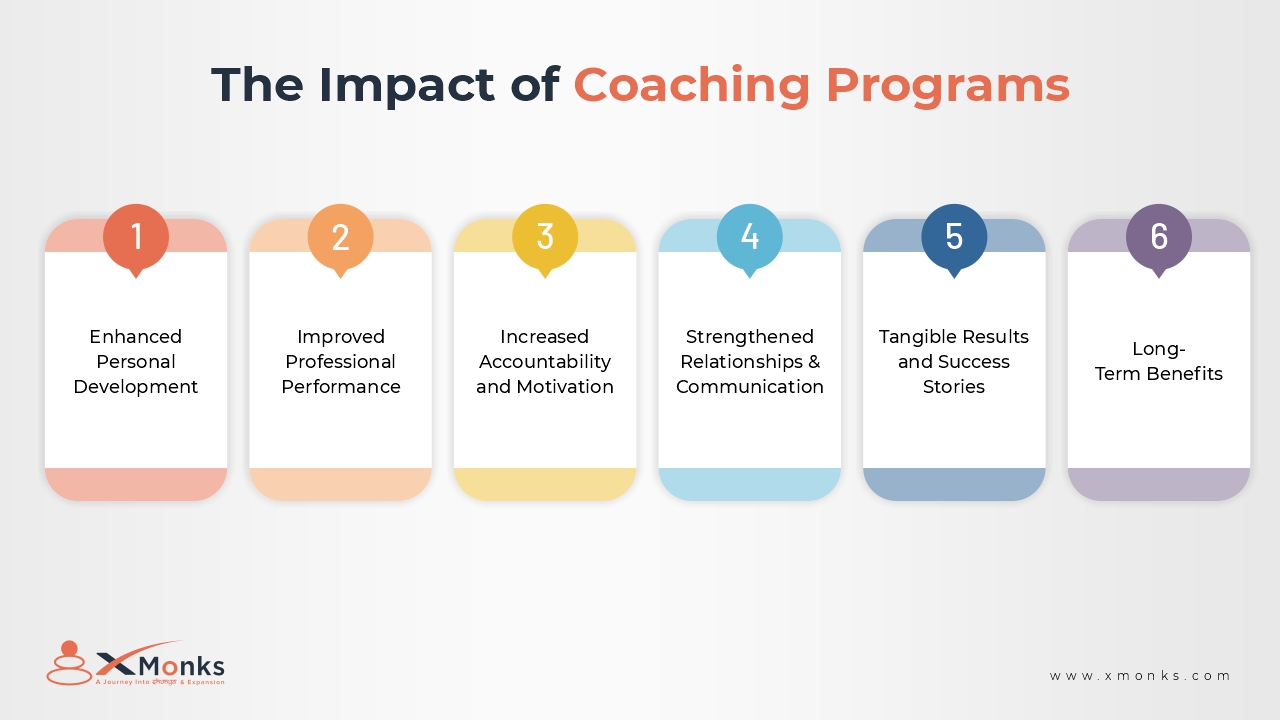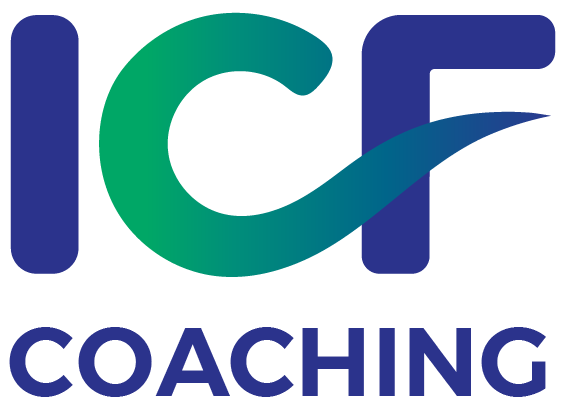The One Stop Guide
To Coach Training and Programs

Introduction
In a world where personal and professional development is paramount, the role of a coach has never been more critical. Whether you’re looking to enhance your own skills or help others achieve their goals, understanding coach training and coaching programs is essential. This comprehensive blog will walk you through everything you need to know about becoming a coach, from selecting the right coach training program to marketing yourself as a successful coach.
What is Coaching?
Coaching is a partnership between a coach and a client that focuses on the client’s growth and development. It involves helping individuals identify their goals, overcome obstacles, and create actionable plans to achieve success. A coach serves as a guide, mentor, and accountability partner, offering support and insight as the client navigates their journey.
Why Invest in Coach Training?

The demand for professional coaches is on the rise. Whether in personal development, career advancement, or organisational growth, coaching has become an essential tool for success. But what makes coach training such a valuable investment? Here are some compelling reasons why you should consider investing in coach training.
1. Develop Essential Skills
Coach training equips you with a unique set of skills that are not only valuable in coaching but also transferable to other areas of your life. These skills include active listening, powerful questioning, emotional intelligence, and goal-setting. By mastering these competencies, you can help others navigate challenges, set and achieve goals, and unlock their potential.
2. Enhance Your Credibility
In a crowded market, standing out as a credible and qualified coach is crucial. Investing in professional coach training provides you with the certification and accreditation needed to establish yourself as an expert in the field. Clients are more likely to trust and engage with a coach who has undergone rigorous training and adheres to professional standards.
3. Increase Your Earning Potential
A well-trained coach is in high demand, and this demand translates into higher earning potential. Whether you choose to work independently, join a coaching firm, or integrate coaching into your existing career, having the right training can significantly increase your income. The return on investment in coach training is often substantial, as it opens doors to lucrative opportunities.
4. Make a Meaningful Impact
One of the most rewarding aspects of being a coach is the ability to make a tangible difference in the lives of others. Through coach training, you learn how to guide clients toward personal and professional growth, helping them overcome obstacles and achieve their goals. The satisfaction of seeing your clients succeed and knowing you played a part in their journey is unparalleled.
5. Continuous Personal Growth
Investing in coach training is not just about helping others; it’s also about your own personal development. The process of becoming a coach involves deep self-reflection, continuous learning, and the development of a growth mindset. As you train to coach others, you inevitably grow and evolve yourself, gaining insights and perspectives that enhance your own life.
6. Stay Competitive in the Industry
The coaching industry is rapidly evolving, with new methodologies, tools, and technologies emerging regularly. By investing in coach training, you stay ahead of industry trends and ensure that your skills remain relevant. Continuous education and professional development are key to maintaining a competitive edge in this dynamic field.
7. Expand Your Network
Coach training programs often provide opportunities to connect with like-minded professionals, mentors, and industry leaders. These connections can lead to collaborations, referrals, and even lifelong friendships. Building a strong network within the coaching community enhances your professional growth and opens up new opportunities for success.
Investing in coach training is a strategic decision. Whether you’re passionate about helping others, seeking personal growth, or aiming to stay competitive in a growing industry, coach training is a valuable investment that can lead to a fulfilling and successful career.
Types of Coaching Programs
Coaching programs come in various forms, each designed to meet specific needs and goals. Understanding the different types of coaching programs can help you choose the one that best aligns with your aspirations.
1. Life Coaching: Life coaching focuses on personal growth, helping individuals improve their relationships, achieve work-life balance, and pursue their passions. It’s ideal for those seeking a more fulfilling life.
2. Executive Coaching: This type of coaching is tailored for business leaders and executives. It aims to enhance leadership skills, decision-making abilities, and organisational effectiveness, making it a popular choice for professionals looking to climb the corporate ladder.
3. Career Coaching: Career coaching assists individuals in navigating their career paths, whether it’s finding the right job, advancing in their current role, or transitioning to a new field. It’s perfect for those looking to achieve professional success.
4. Health and Wellness Coaching: Focused on improving physical and mental well-being, health and wellness coaching helps clients adopt healthier lifestyles through diet, exercise, and stress management.
Each of these coaching programs offers unique benefits, making it essential to select one that aligns with your personal or professional goals.
Understanding Coach Training
Coach training programs are designed to develop core competencies in coaching. These include active listening, powerful questioning, and emotional intelligence. Programs are often accredited by organisations such as the International Coach Federation (ICF), which ensures that they meet high standards of quality. The curriculum typically covers a range of topics, including coaching techniques, ethics, and business development.
Coach training is the foundation for anyone looking to pursue a career in coaching. Whether you aspire to be a life coach, executive coach, or any other type of coach, understanding the components of coach training is crucial to your success.
What is Coach Training?
Coach training programs are designed to equip you with the skills and knowledge needed to effectively guide clients toward achieving their goals. These programs cover a wide range of topics, including communication techniques, goal-setting strategies, and the psychology of behaviour change. The training also emphasises the development of essential coaching competencies, such as active listening, powerful questioning, and emotional intelligence.
Accreditation and Certification
One of the key aspects of coach training is accreditation. Accredited programs, often recognised by organisations like the International Coach Federation (ICF), ensure that the training meets high industry standards. Completing an accredited program not only enhances your credibility but also opens the door to certification. Certification is a formal recognition of your skills and qualifications, making you a more attractive candidate to potential clients and employers.
The Curriculum
A typical coach training curriculum is comprehensive, covering both theoretical and practical aspects of coaching. You’ll learn how to conduct coaching sessions, build client relationships, and develop a coaching business. Additionally, many programs offer specialised tracks, allowing you to focus on areas like career coaching, health coaching, or executive coaching.
Understanding coach training is the first step toward becoming a successful coach. By choosing the right program and dedicating yourself to mastering the necessary skills, you can build a rewarding career that positively impacts the lives of others.
Choosing the Right Coaching Program
Selecting the right coaching program is a critical step toward becoming a successful coach. With numerous options available, making an informed decision can significantly impact your future career.
1. Accreditation Matters: Ensure the program you choose is accredited by a recognised organisation, such as the International Coach Federation (ICF). Accreditation guarantees that the program meets high industry standards and enhances your credibility as a coach.
2. Consider Your Goals: Identify your coaching niche before selecting a program. Whether you’re interested in life coaching, executive coaching, or health coaching, choose a program that offers specialised training in your area of interest.
3. Evaluate the Curriculum: Review the program’s curriculum to ensure it covers both theoretical and practical aspects of coaching. Look for programs that provide hands-on experience, such as supervised coaching sessions, which are essential for developing your skills.
4. Cost and Duration: Consider your budget and the time you can dedicate to the training. While some programs are intensive and completed in a few months, others may take longer but offer a deeper understanding of coaching.
By carefully considering these factors, you can choose a coaching program that aligns with your goals and sets you on the path to success.
The Journey to Becoming a Certified Coach
Becoming a certified coach involves several steps, including completing a training program, gaining coaching experience, and passing a certification exam. This process can be challenging, but with dedication and perseverance, you can achieve certification and start your coaching career.
Key Skills Developed in Coach Training
Coach training is not just about learning how to guide others; it’s about developing a set of essential skills that are crucial for effective coaching. These skills form the backbone of a successful coaching practice and are transferable to various aspects of life.
Active Listening
Active listening is at the core of effective coaching. It involves fully concentrating on what the client is saying, understanding their message, and responding thoughtfully. This skill allows coaches to grasp the underlying issues their clients are facing, which is critical for providing relevant guidance.
Powerful Questioning
The ability to ask powerful, thought-provoking questions is another key skill developed in coach training. These questions encourage clients to explore their thoughts and feelings, leading to deeper insights and self-awareness. It’s about guiding clients to find their own solutions rather than providing direct answers.
Emotional Intelligence
Coaches must be adept at managing both their own emotions and those of their clients. Emotional intelligence involves recognising and understanding emotions, which is vital for building trust and rapport. This skill helps coaches navigate complex emotional landscapes, ensuring that they can support their clients effectively.
Goal Setting and Action Planning
Coach training teaches the art of setting realistic and achievable goals. Coaches learn how to help clients define their objectives clearly and create actionable plans to reach them. This skill is essential for guiding clients through their journey and keeping them motivated.
Building Rapport
Establishing a strong connection with clients is essential for effective coaching. Training programs emphasise the importance of empathy, trust, and open communication, which are key components of building rapport. A solid coach-client relationship fosters a safe environment for growth and change.
The Impact of Coaching Programs

From enhancing leadership skills to improving personal well-being, coaching programs offer transformative benefits that extend far beyond initial expectations. Understanding the impact of coaching programs can help individuals and organisations recognise their value and potential.
Enhanced Personal Development
One of the most significant impacts of coaching programs is on personal development. Individuals who participate in coaching often experience increased self-awareness, improved confidence, and a clearer sense of direction. By working with a coach, people can identify their strengths and areas for growth, set achievable goals, and develop strategies to overcome obstacles. This process leads to a greater understanding of oneself and fosters continuous personal growth.
Improved Professional Performance
In the workplace, coaching programs are known for boosting professional performance. Executive coaching, for instance, helps leaders develop critical skills such as strategic thinking, decision-making, and team management. By providing tailored feedback and support, coaching programs enable professionals to enhance their effectiveness, drive better results, and advance in their careers. This improvement not only benefits the individual but also contributes to the overall success of the organisation.
Increased Accountability and Motivation
Coaching programs foster a sense of accountability and motivation. Coaches work with clients to set specific, measurable goals and create actionable plans. Regular coaching sessions provide ongoing support and encouragement, helping individuals stay committed to their objectives. This accountability often leads to higher levels of motivation and perseverance, as clients are more likely to follow through on their plans when they have someone to hold them accountable.
Strengthened Relationships and Communication
Coaching programs often focus on improving interpersonal skills, such as communication and relationship-building. For leaders, effective coaching can enhance their ability to connect with and inspire their teams. By developing better listening skills, empathy, and communication techniques, individuals can foster stronger, more collaborative relationships in both personal and professional settings.
Tangible Results and Success Stories
The impact of coaching programs is often reflected in tangible results and success stories. Many clients report significant achievements, such as career advancement, improved work-life balance, and personal breakthroughs. Case studies and testimonials from individuals and organisations highlight the positive outcomes of coaching, showcasing how these programs lead to meaningful and measurable changes.
Long-Term Benefits
The benefits of coaching programs extend beyond the duration of the coaching relationship. The skills, insights, and strategies gained through coaching often have long-lasting effects. Individuals and organisations that invest in coaching programs frequently experience sustained improvements in performance, well-being, and overall success.
The impact of coaching programs is profound and multifaceted. Whether for individuals seeking personal growth or organisations aiming to develop their leaders, investing in coaching programs can lead to transformative results and a brighter future.
How to Market Yourself as a Coach
Marketing yourself as a coach involves showcasing your skills and establishing a strong personal brand. Start by defining your niche and target audience. Whether you specialise in executive, life, or health coaching, clarity in your focus helps attract the right clients. Develop a professional website that highlights your services, qualifications, and client testimonials. Use social media platforms to share valuable content, such as tips and success stories, to engage potential clients and build credibility.
Networking is also crucial. Attend industry events, join professional groups, and connect with other coaches to expand your reach. Offering free workshops or webinars can demonstrate your expertise and attract new clients. Consider obtaining certifications from recognised organisations to enhance your credibility. Finally, leverage client testimonials and case studies to build trust and showcase the impact of your coaching.
By combining these strategies, you can effectively market yourself, build a strong client base, and establish a successful coaching practice.
Continuing Education for Coaches
Continuing education is vital for coaches to stay relevant and effective in their practice. The coaching field is dynamic, with new methodologies and techniques emerging regularly. Enrolling in advanced courses or workshops helps you stay updated with the latest trends and tools.
Participate in industry conferences and seminars to gain insights from leading experts and network with peers. Many coaching organisations offer ongoing training programs that provide new perspectives and enhance your skills. Additionally, pursuing specialised certifications can differentiate you from other coaches and expand your service offerings.
Regularly engaging in professional development not only improves your coaching abilities but also demonstrates a commitment to excellence, which can attract more clients. Continuing education is an investment in your career that pays off by enriching your practice and helping you provide the best possible support to your clients.
Ethical Considerations in Coaching
Ethical considerations are paramount in coaching to ensure trust and professionalism in the coaching relationship. Coaches must adhere to a code of ethics that emphasises client confidentiality, integrity, and respect. Confidentiality is crucial, as it builds trust and allows clients to share sensitive information without fear of it being disclosed.
Another ethical aspect is maintaining professional boundaries. Coaches should avoid conflicts of interest and ensure that their personal or financial interests do not influence their professional judgement. It’s essential to provide honest feedback and not promise unrealistic outcomes.
Additionally, coaches should seek informed consent from clients before starting the coaching process, ensuring clients understand the scope, goals, and limitations of the coaching relationship. Coaches must also be aware of their own limitations and refer clients to other professionals when necessary, such as mental health experts, if issues arise beyond their expertise.
By adhering to these ethical principles, coaches create a safe and effective coaching environment, fostering trust and facilitating meaningful growth for their clients.
Challenges in the Coaching Industry
The coaching industry, while rewarding, faces several challenges that professionals must navigate. One significant challenge is market saturation. With an increasing number of coaches entering the field, distinguishing oneself from competitors can be difficult. Building a strong personal brand and niche expertise is essential for standing out.
Another challenge is the lack of regulation and standardisation. Unlike other professions, coaching does not have universal regulations, which can lead to varying levels of quality and credibility among practitioners. Clients may find it challenging to assess the qualifications and effectiveness of different coaches.
Additionally, coaches often face challenges in client acquisition and retention. Developing a robust marketing strategy and maintaining client satisfaction through consistent results and strong rapport are crucial for a successful practice.
Lastly, managing the business aspects of coaching, such as setting fees, handling administrative tasks, and balancing client loads, can be demanding. Coaches need to effectively manage these aspects to sustain and grow their practice successfully.
Addressing these challenges with strategic planning and ongoing professional development can help coaches build a successful and reputable practice.
The Future of Coaching
The demand for coaching services is on the rise, so is the demand for coach training and coaching programs; and the industry is poised for continued growth. The future of coaching is set to be dynamic and transformative, driven by technological advancements and evolving client needs. As the coaching industry continues to grow, several key trends are shaping its future.
Integration of Technology
Technology is revolutionising coaching, with digital platforms and tools enhancing accessibility and convenience. Virtual coaching sessions, AI-powered coaching assistants, and advanced analytics are making coaching more interactive and data-driven. These innovations allow coaches to reach a global audience and provide more personalised support.
Increased Specialisation
The coaching field is witnessing a rise in niche specialisations. From wellness coaching to leadership development, clients are seeking coaches with expertise tailored to their specific needs. This trend towards specialisation enables coaches to build deep expertise and cater to unique client demands.
Focus on Holistic Development
Future coaching practices are expected to emphasise holistic development, addressing not just professional goals but also personal well-being. Coaches will increasingly integrate aspects like mental health, work-life balance, and emotional intelligence into their programs.
Ethical and Inclusive Practices
The industry will likely see a stronger emphasis on ethical standards and
inclusivity. Coaches will be expected to uphold high ethical practices and create inclusive
environments that respect diverse backgrounds and perspectives.
As coaching continues to evolve, embracing these trends will be crucial for staying relevant and effective in the future landscape of coaching.
Conclusion
Investing in coach training and pursuing a career in coaching is a rewarding journey that offers countless opportunities for personal and professional growth. By selecting the right coaching programs, developing key skills, and staying committed to ongoing education, you can build a successful coaching practice that makes a meaningful impact on the lives of others.

